Icon College - Unit 12: Organizational Behaviour Report Analysis
VerifiedAdded on 2023/01/17
|12
|4470
|96
Report
AI Summary
This report delves into the realm of organizational behaviour, focusing on the interplay of culture, politics, and power and their impact on team and individual performance within the Arcadia Group. It examines the application of Handy's culture model and French and Raven's power model to enhance workplace dynamics. The report then evaluates various motivational theories, including McClelland's theory of needs and Adam's equity theory, and their influence on employee behaviour. Furthermore, it differentiates between effective and ineffective teams, exploring theories of team development. Finally, the report applies key concepts and philosophies of organizational behaviour to the context of the Arcadia Group, offering insights into fostering a productive and motivated work environment.
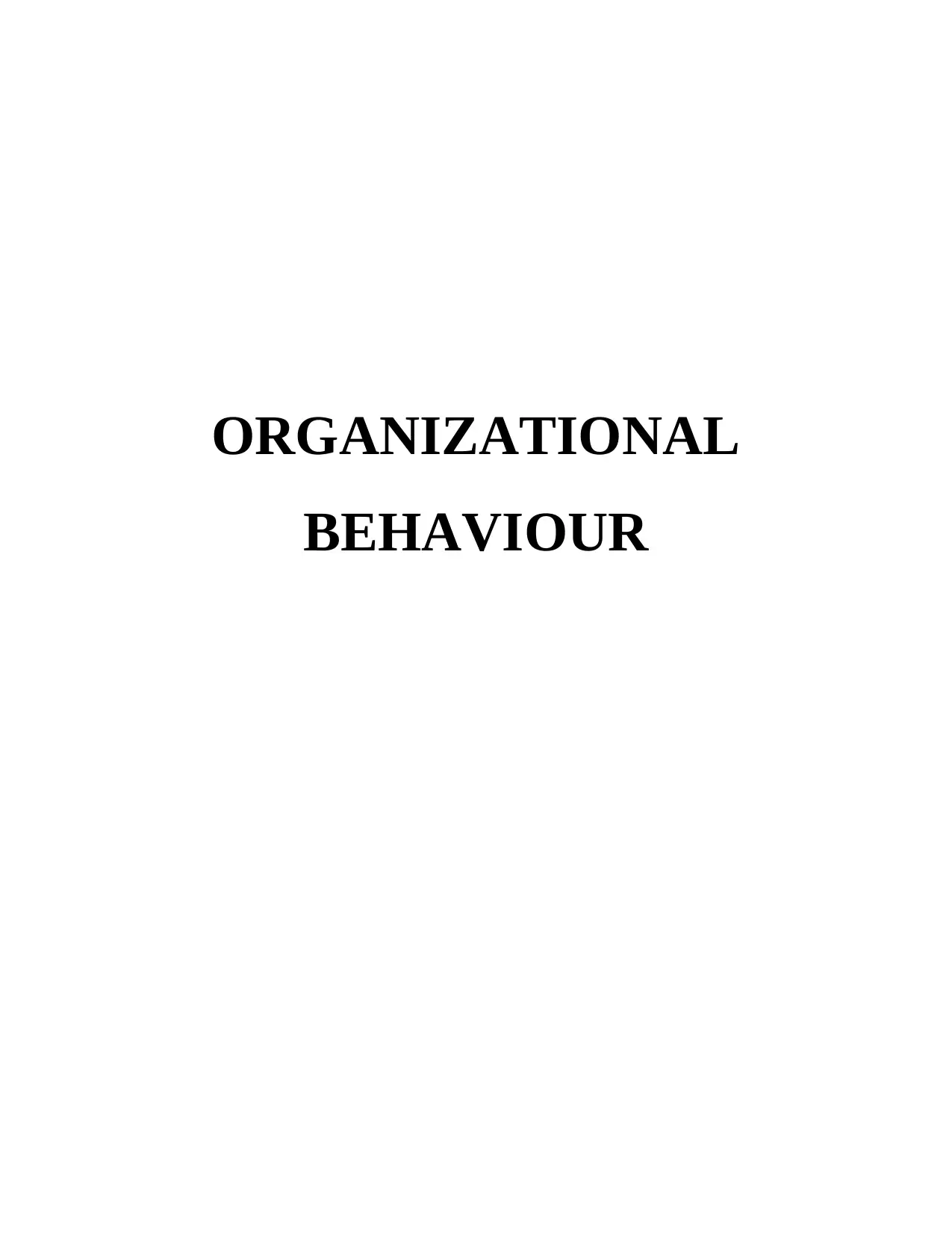
ORGANIZATIONAL
BEHAVIOUR
BEHAVIOUR
Paraphrase This Document
Need a fresh take? Get an instant paraphrase of this document with our AI Paraphraser
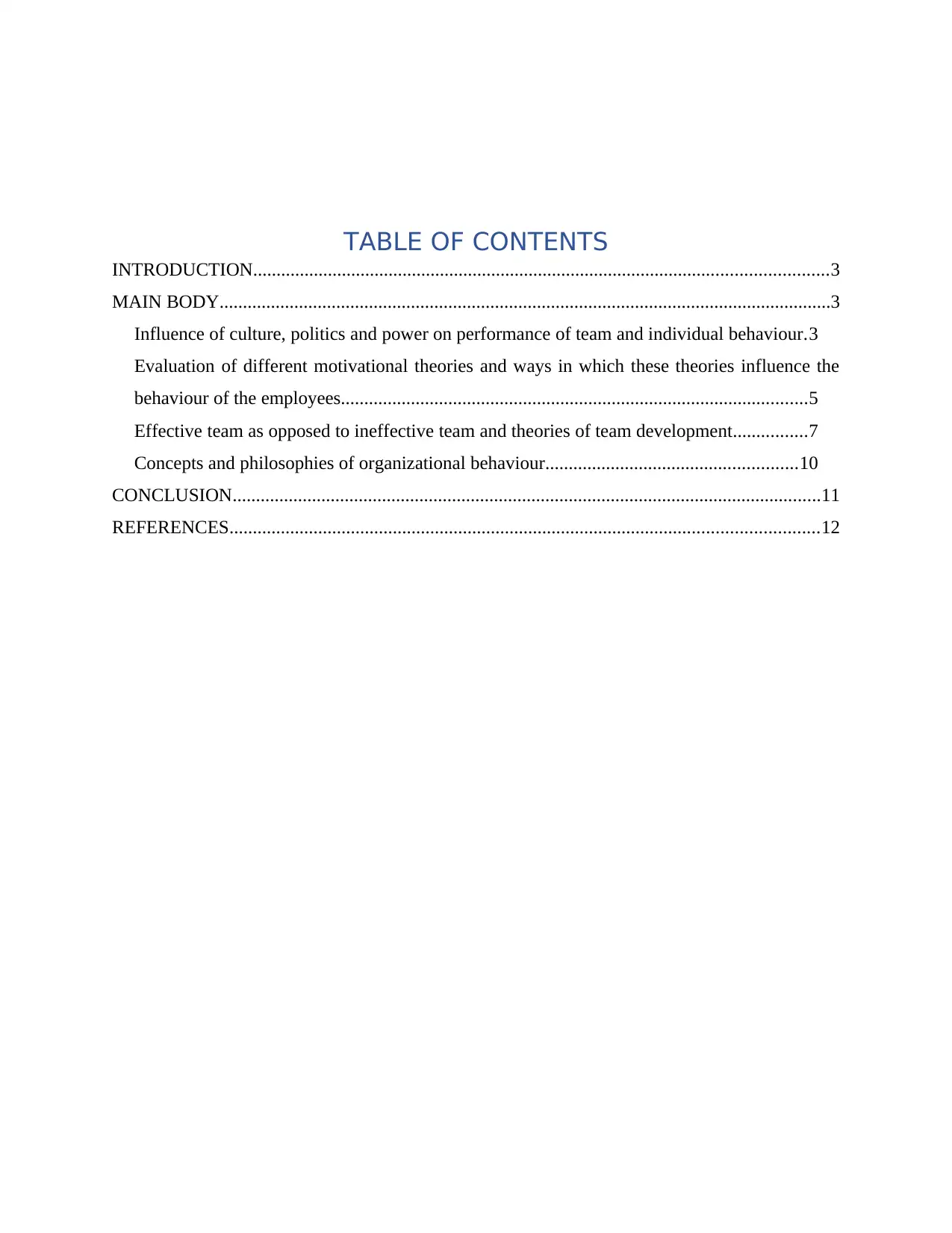
TABLE OF CONTENTS
INTRODUCTION...........................................................................................................................3
MAIN BODY...................................................................................................................................3
Influence of culture, politics and power on performance of team and individual behaviour.3
Evaluation of different motivational theories and ways in which these theories influence the
behaviour of the employees....................................................................................................5
Effective team as opposed to ineffective team and theories of team development................7
Concepts and philosophies of organizational behaviour......................................................10
CONCLUSION..............................................................................................................................11
REFERENCES..............................................................................................................................12
INTRODUCTION...........................................................................................................................3
MAIN BODY...................................................................................................................................3
Influence of culture, politics and power on performance of team and individual behaviour.3
Evaluation of different motivational theories and ways in which these theories influence the
behaviour of the employees....................................................................................................5
Effective team as opposed to ineffective team and theories of team development................7
Concepts and philosophies of organizational behaviour......................................................10
CONCLUSION..............................................................................................................................11
REFERENCES..............................................................................................................................12
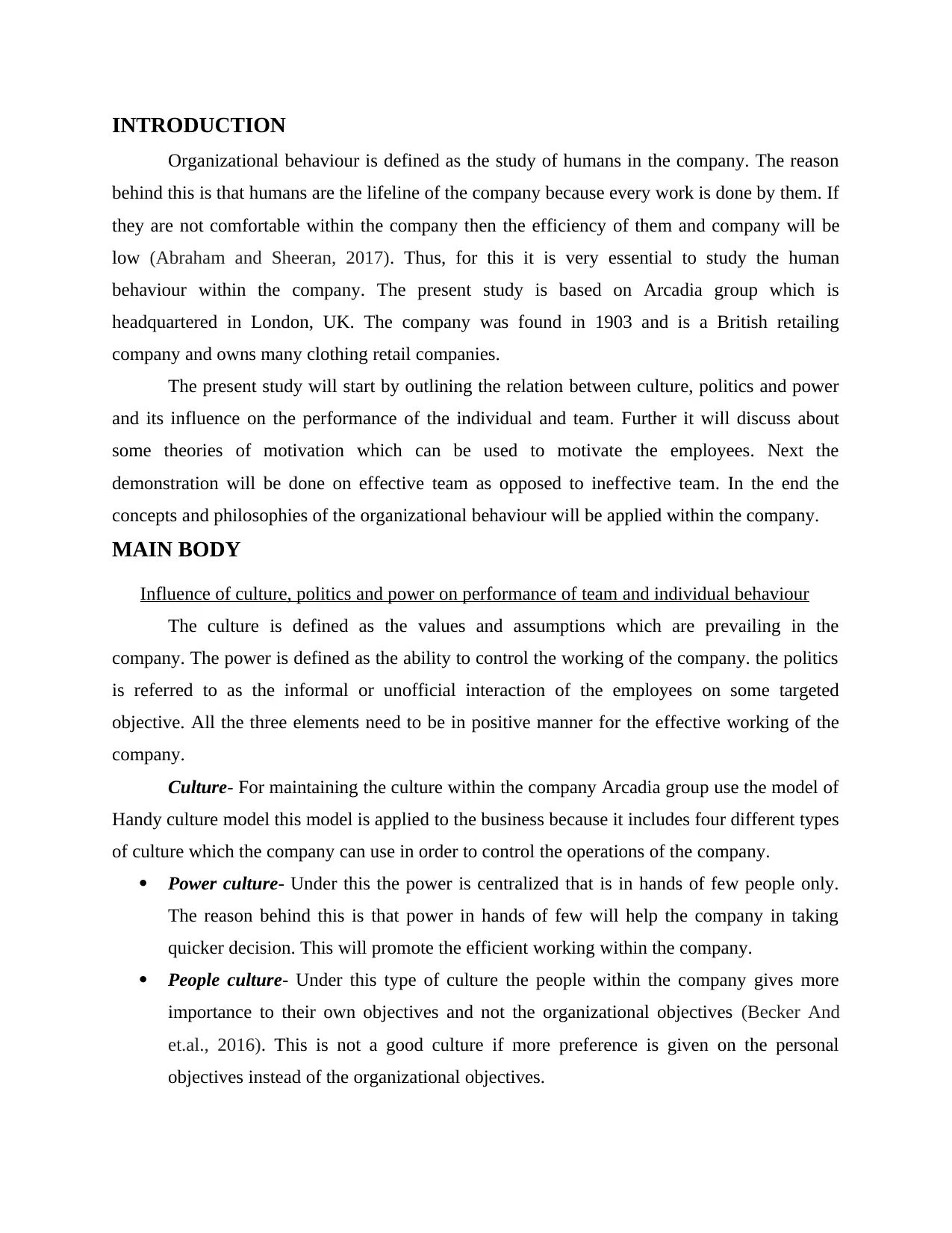
INTRODUCTION
Organizational behaviour is defined as the study of humans in the company. The reason
behind this is that humans are the lifeline of the company because every work is done by them. If
they are not comfortable within the company then the efficiency of them and company will be
low (Abraham and Sheeran, 2017). Thus, for this it is very essential to study the human
behaviour within the company. The present study is based on Arcadia group which is
headquartered in London, UK. The company was found in 1903 and is a British retailing
company and owns many clothing retail companies.
The present study will start by outlining the relation between culture, politics and power
and its influence on the performance of the individual and team. Further it will discuss about
some theories of motivation which can be used to motivate the employees. Next the
demonstration will be done on effective team as opposed to ineffective team. In the end the
concepts and philosophies of the organizational behaviour will be applied within the company.
MAIN BODY
Influence of culture, politics and power on performance of team and individual behaviour
The culture is defined as the values and assumptions which are prevailing in the
company. The power is defined as the ability to control the working of the company. the politics
is referred to as the informal or unofficial interaction of the employees on some targeted
objective. All the three elements need to be in positive manner for the effective working of the
company.
Culture- For maintaining the culture within the company Arcadia group use the model of
Handy culture model this model is applied to the business because it includes four different types
of culture which the company can use in order to control the operations of the company.
Power culture- Under this the power is centralized that is in hands of few people only.
The reason behind this is that power in hands of few will help the company in taking
quicker decision. This will promote the efficient working within the company.
People culture- Under this type of culture the people within the company gives more
importance to their own objectives and not the organizational objectives (Becker And
et.al., 2016). This is not a good culture if more preference is given on the personal
objectives instead of the organizational objectives.
Organizational behaviour is defined as the study of humans in the company. The reason
behind this is that humans are the lifeline of the company because every work is done by them. If
they are not comfortable within the company then the efficiency of them and company will be
low (Abraham and Sheeran, 2017). Thus, for this it is very essential to study the human
behaviour within the company. The present study is based on Arcadia group which is
headquartered in London, UK. The company was found in 1903 and is a British retailing
company and owns many clothing retail companies.
The present study will start by outlining the relation between culture, politics and power
and its influence on the performance of the individual and team. Further it will discuss about
some theories of motivation which can be used to motivate the employees. Next the
demonstration will be done on effective team as opposed to ineffective team. In the end the
concepts and philosophies of the organizational behaviour will be applied within the company.
MAIN BODY
Influence of culture, politics and power on performance of team and individual behaviour
The culture is defined as the values and assumptions which are prevailing in the
company. The power is defined as the ability to control the working of the company. the politics
is referred to as the informal or unofficial interaction of the employees on some targeted
objective. All the three elements need to be in positive manner for the effective working of the
company.
Culture- For maintaining the culture within the company Arcadia group use the model of
Handy culture model this model is applied to the business because it includes four different types
of culture which the company can use in order to control the operations of the company.
Power culture- Under this the power is centralized that is in hands of few people only.
The reason behind this is that power in hands of few will help the company in taking
quicker decision. This will promote the efficient working within the company.
People culture- Under this type of culture the people within the company gives more
importance to their own objectives and not the organizational objectives (Becker And
et.al., 2016). This is not a good culture if more preference is given on the personal
objectives instead of the organizational objectives.
⊘ This is a preview!⊘
Do you want full access?
Subscribe today to unlock all pages.

Trusted by 1+ million students worldwide
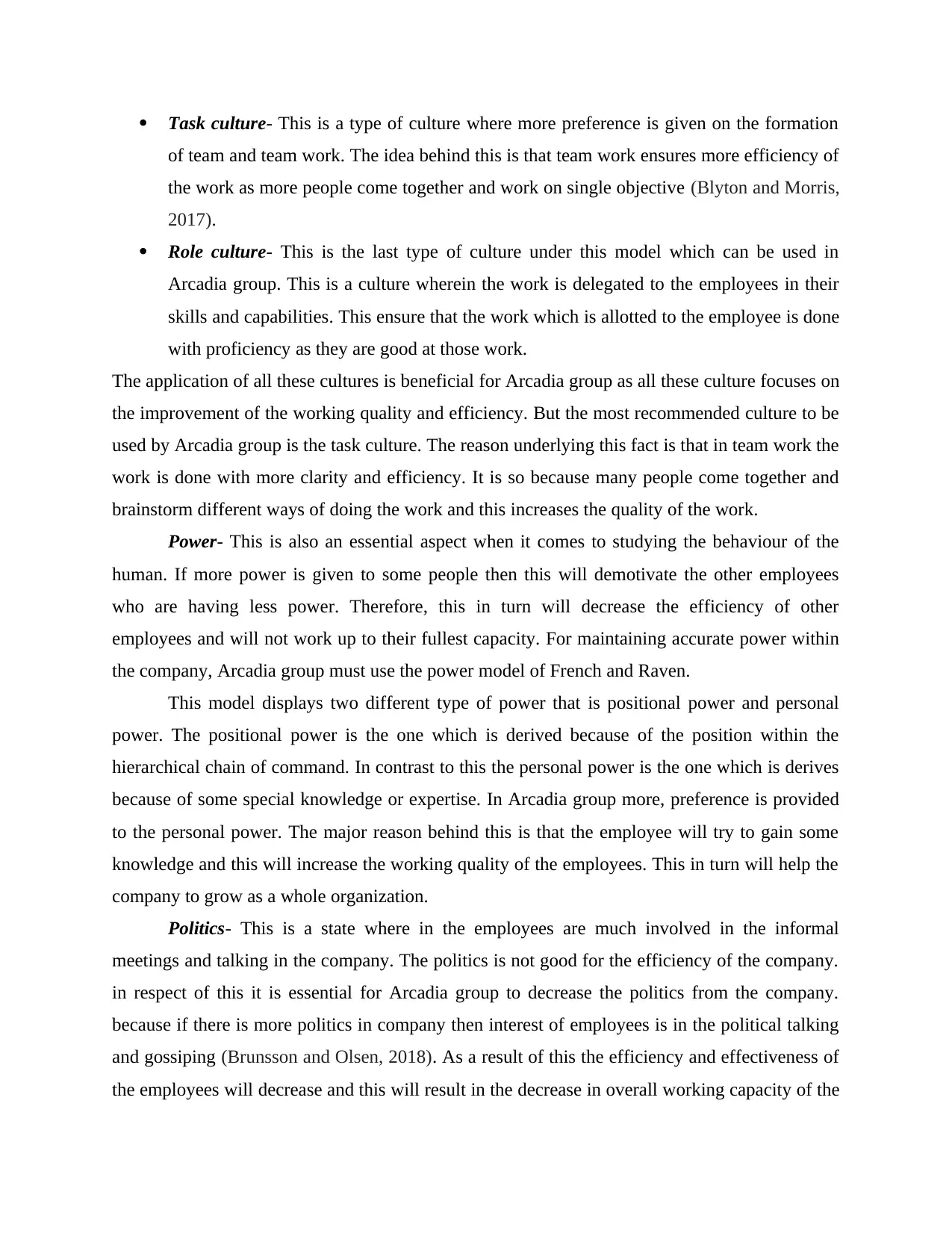
Task culture- This is a type of culture where more preference is given on the formation
of team and team work. The idea behind this is that team work ensures more efficiency of
the work as more people come together and work on single objective (Blyton and Morris,
2017).
Role culture- This is the last type of culture under this model which can be used in
Arcadia group. This is a culture wherein the work is delegated to the employees in their
skills and capabilities. This ensure that the work which is allotted to the employee is done
with proficiency as they are good at those work.
The application of all these cultures is beneficial for Arcadia group as all these culture focuses on
the improvement of the working quality and efficiency. But the most recommended culture to be
used by Arcadia group is the task culture. The reason underlying this fact is that in team work the
work is done with more clarity and efficiency. It is so because many people come together and
brainstorm different ways of doing the work and this increases the quality of the work.
Power- This is also an essential aspect when it comes to studying the behaviour of the
human. If more power is given to some people then this will demotivate the other employees
who are having less power. Therefore, this in turn will decrease the efficiency of other
employees and will not work up to their fullest capacity. For maintaining accurate power within
the company, Arcadia group must use the power model of French and Raven.
This model displays two different type of power that is positional power and personal
power. The positional power is the one which is derived because of the position within the
hierarchical chain of command. In contrast to this the personal power is the one which is derives
because of some special knowledge or expertise. In Arcadia group more, preference is provided
to the personal power. The major reason behind this is that the employee will try to gain some
knowledge and this will increase the working quality of the employees. This in turn will help the
company to grow as a whole organization.
Politics- This is a state where in the employees are much involved in the informal
meetings and talking in the company. The politics is not good for the efficiency of the company.
in respect of this it is essential for Arcadia group to decrease the politics from the company.
because if there is more politics in company then interest of employees is in the political talking
and gossiping (Brunsson and Olsen, 2018). As a result of this the efficiency and effectiveness of
the employees will decrease and this will result in the decrease in overall working capacity of the
of team and team work. The idea behind this is that team work ensures more efficiency of
the work as more people come together and work on single objective (Blyton and Morris,
2017).
Role culture- This is the last type of culture under this model which can be used in
Arcadia group. This is a culture wherein the work is delegated to the employees in their
skills and capabilities. This ensure that the work which is allotted to the employee is done
with proficiency as they are good at those work.
The application of all these cultures is beneficial for Arcadia group as all these culture focuses on
the improvement of the working quality and efficiency. But the most recommended culture to be
used by Arcadia group is the task culture. The reason underlying this fact is that in team work the
work is done with more clarity and efficiency. It is so because many people come together and
brainstorm different ways of doing the work and this increases the quality of the work.
Power- This is also an essential aspect when it comes to studying the behaviour of the
human. If more power is given to some people then this will demotivate the other employees
who are having less power. Therefore, this in turn will decrease the efficiency of other
employees and will not work up to their fullest capacity. For maintaining accurate power within
the company, Arcadia group must use the power model of French and Raven.
This model displays two different type of power that is positional power and personal
power. The positional power is the one which is derived because of the position within the
hierarchical chain of command. In contrast to this the personal power is the one which is derives
because of some special knowledge or expertise. In Arcadia group more, preference is provided
to the personal power. The major reason behind this is that the employee will try to gain some
knowledge and this will increase the working quality of the employees. This in turn will help the
company to grow as a whole organization.
Politics- This is a state where in the employees are much involved in the informal
meetings and talking in the company. The politics is not good for the efficiency of the company.
in respect of this it is essential for Arcadia group to decrease the politics from the company.
because if there is more politics in company then interest of employees is in the political talking
and gossiping (Brunsson and Olsen, 2018). As a result of this the efficiency and effectiveness of
the employees will decrease and this will result in the decrease in overall working capacity of the
Paraphrase This Document
Need a fresh take? Get an instant paraphrase of this document with our AI Paraphraser
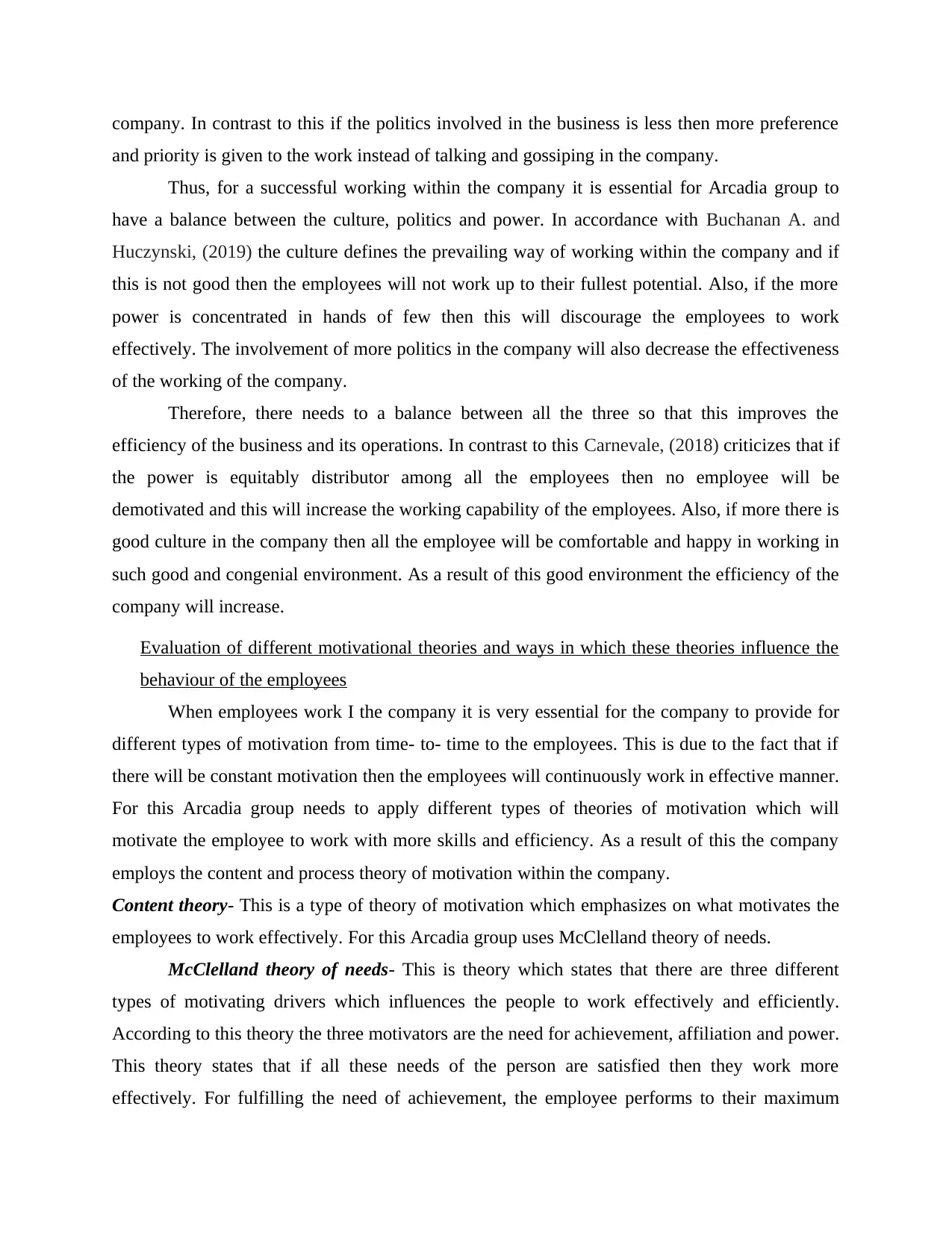
company. In contrast to this if the politics involved in the business is less then more preference
and priority is given to the work instead of talking and gossiping in the company.
Thus, for a successful working within the company it is essential for Arcadia group to
have a balance between the culture, politics and power. In accordance with Buchanan A. and
Huczynski, (2019) the culture defines the prevailing way of working within the company and if
this is not good then the employees will not work up to their fullest potential. Also, if the more
power is concentrated in hands of few then this will discourage the employees to work
effectively. The involvement of more politics in the company will also decrease the effectiveness
of the working of the company.
Therefore, there needs to a balance between all the three so that this improves the
efficiency of the business and its operations. In contrast to this Carnevale, (2018) criticizes that if
the power is equitably distributor among all the employees then no employee will be
demotivated and this will increase the working capability of the employees. Also, if more there is
good culture in the company then all the employee will be comfortable and happy in working in
such good and congenial environment. As a result of this good environment the efficiency of the
company will increase.
Evaluation of different motivational theories and ways in which these theories influence the
behaviour of the employees
When employees work I the company it is very essential for the company to provide for
different types of motivation from time- to- time to the employees. This is due to the fact that if
there will be constant motivation then the employees will continuously work in effective manner.
For this Arcadia group needs to apply different types of theories of motivation which will
motivate the employee to work with more skills and efficiency. As a result of this the company
employs the content and process theory of motivation within the company.
Content theory- This is a type of theory of motivation which emphasizes on what motivates the
employees to work effectively. For this Arcadia group uses McClelland theory of needs.
McClelland theory of needs- This is theory which states that there are three different
types of motivating drivers which influences the people to work effectively and efficiently.
According to this theory the three motivators are the need for achievement, affiliation and power.
This theory states that if all these needs of the person are satisfied then they work more
effectively. For fulfilling the need of achievement, the employee performs to their maximum
and priority is given to the work instead of talking and gossiping in the company.
Thus, for a successful working within the company it is essential for Arcadia group to
have a balance between the culture, politics and power. In accordance with Buchanan A. and
Huczynski, (2019) the culture defines the prevailing way of working within the company and if
this is not good then the employees will not work up to their fullest potential. Also, if the more
power is concentrated in hands of few then this will discourage the employees to work
effectively. The involvement of more politics in the company will also decrease the effectiveness
of the working of the company.
Therefore, there needs to a balance between all the three so that this improves the
efficiency of the business and its operations. In contrast to this Carnevale, (2018) criticizes that if
the power is equitably distributor among all the employees then no employee will be
demotivated and this will increase the working capability of the employees. Also, if more there is
good culture in the company then all the employee will be comfortable and happy in working in
such good and congenial environment. As a result of this good environment the efficiency of the
company will increase.
Evaluation of different motivational theories and ways in which these theories influence the
behaviour of the employees
When employees work I the company it is very essential for the company to provide for
different types of motivation from time- to- time to the employees. This is due to the fact that if
there will be constant motivation then the employees will continuously work in effective manner.
For this Arcadia group needs to apply different types of theories of motivation which will
motivate the employee to work with more skills and efficiency. As a result of this the company
employs the content and process theory of motivation within the company.
Content theory- This is a type of theory of motivation which emphasizes on what motivates the
employees to work effectively. For this Arcadia group uses McClelland theory of needs.
McClelland theory of needs- This is theory which states that there are three different
types of motivating drivers which influences the people to work effectively and efficiently.
According to this theory the three motivators are the need for achievement, affiliation and power.
This theory states that if all these needs of the person are satisfied then they work more
effectively. For fulfilling the need of achievement, the employee performs to their maximum
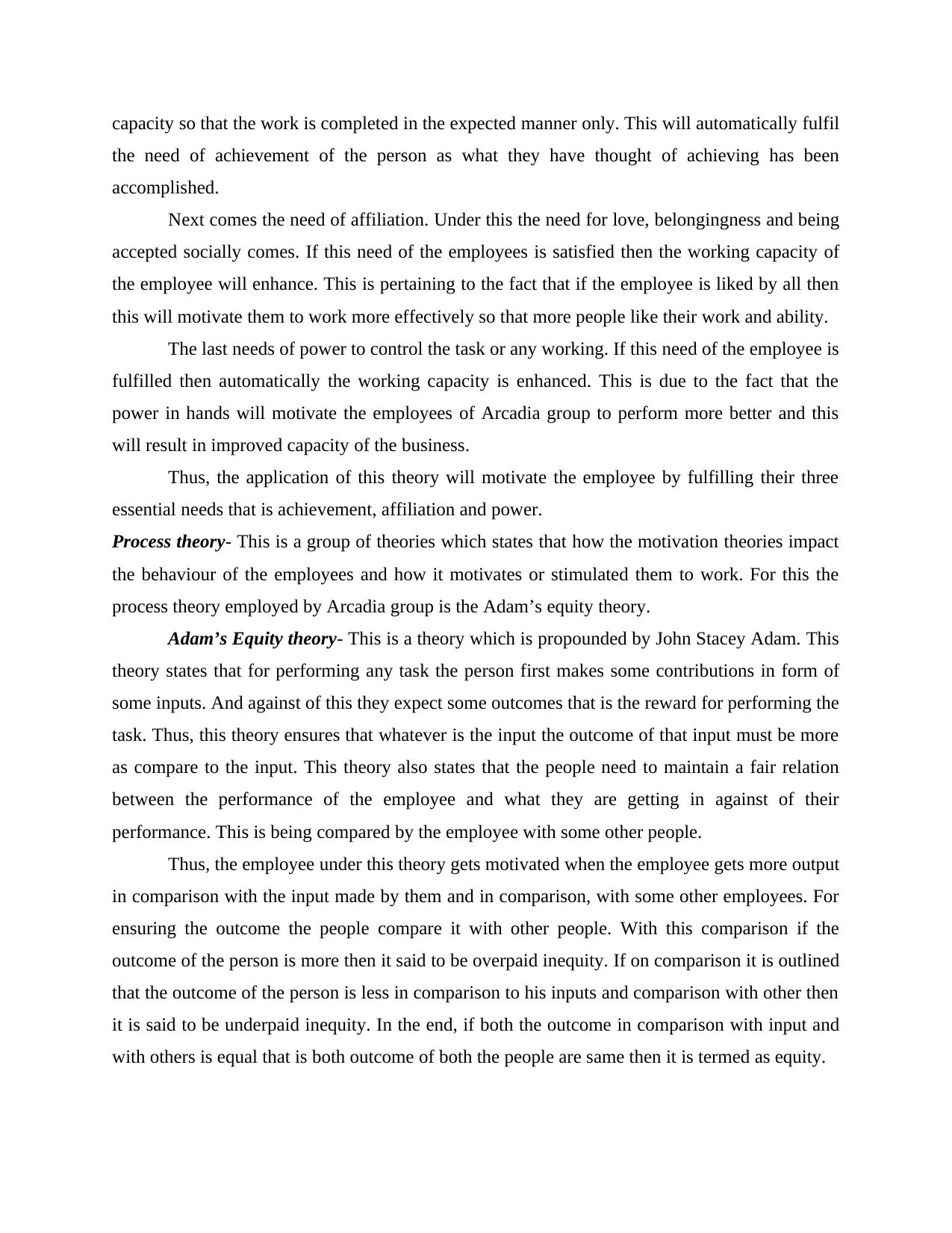
capacity so that the work is completed in the expected manner only. This will automatically fulfil
the need of achievement of the person as what they have thought of achieving has been
accomplished.
Next comes the need of affiliation. Under this the need for love, belongingness and being
accepted socially comes. If this need of the employees is satisfied then the working capacity of
the employee will enhance. This is pertaining to the fact that if the employee is liked by all then
this will motivate them to work more effectively so that more people like their work and ability.
The last needs of power to control the task or any working. If this need of the employee is
fulfilled then automatically the working capacity is enhanced. This is due to the fact that the
power in hands will motivate the employees of Arcadia group to perform more better and this
will result in improved capacity of the business.
Thus, the application of this theory will motivate the employee by fulfilling their three
essential needs that is achievement, affiliation and power.
Process theory- This is a group of theories which states that how the motivation theories impact
the behaviour of the employees and how it motivates or stimulated them to work. For this the
process theory employed by Arcadia group is the Adam’s equity theory.
Adam’s Equity theory- This is a theory which is propounded by John Stacey Adam. This
theory states that for performing any task the person first makes some contributions in form of
some inputs. And against of this they expect some outcomes that is the reward for performing the
task. Thus, this theory ensures that whatever is the input the outcome of that input must be more
as compare to the input. This theory also states that the people need to maintain a fair relation
between the performance of the employee and what they are getting in against of their
performance. This is being compared by the employee with some other people.
Thus, the employee under this theory gets motivated when the employee gets more output
in comparison with the input made by them and in comparison, with some other employees. For
ensuring the outcome the people compare it with other people. With this comparison if the
outcome of the person is more then it said to be overpaid inequity. If on comparison it is outlined
that the outcome of the person is less in comparison to his inputs and comparison with other then
it is said to be underpaid inequity. In the end, if both the outcome in comparison with input and
with others is equal that is both outcome of both the people are same then it is termed as equity.
the need of achievement of the person as what they have thought of achieving has been
accomplished.
Next comes the need of affiliation. Under this the need for love, belongingness and being
accepted socially comes. If this need of the employees is satisfied then the working capacity of
the employee will enhance. This is pertaining to the fact that if the employee is liked by all then
this will motivate them to work more effectively so that more people like their work and ability.
The last needs of power to control the task or any working. If this need of the employee is
fulfilled then automatically the working capacity is enhanced. This is due to the fact that the
power in hands will motivate the employees of Arcadia group to perform more better and this
will result in improved capacity of the business.
Thus, the application of this theory will motivate the employee by fulfilling their three
essential needs that is achievement, affiliation and power.
Process theory- This is a group of theories which states that how the motivation theories impact
the behaviour of the employees and how it motivates or stimulated them to work. For this the
process theory employed by Arcadia group is the Adam’s equity theory.
Adam’s Equity theory- This is a theory which is propounded by John Stacey Adam. This
theory states that for performing any task the person first makes some contributions in form of
some inputs. And against of this they expect some outcomes that is the reward for performing the
task. Thus, this theory ensures that whatever is the input the outcome of that input must be more
as compare to the input. This theory also states that the people need to maintain a fair relation
between the performance of the employee and what they are getting in against of their
performance. This is being compared by the employee with some other people.
Thus, the employee under this theory gets motivated when the employee gets more output
in comparison with the input made by them and in comparison, with some other employees. For
ensuring the outcome the people compare it with other people. With this comparison if the
outcome of the person is more then it said to be overpaid inequity. If on comparison it is outlined
that the outcome of the person is less in comparison to his inputs and comparison with other then
it is said to be underpaid inequity. In the end, if both the outcome in comparison with input and
with others is equal that is both outcome of both the people are same then it is termed as equity.
⊘ This is a preview!⊘
Do you want full access?
Subscribe today to unlock all pages.

Trusted by 1+ million students worldwide
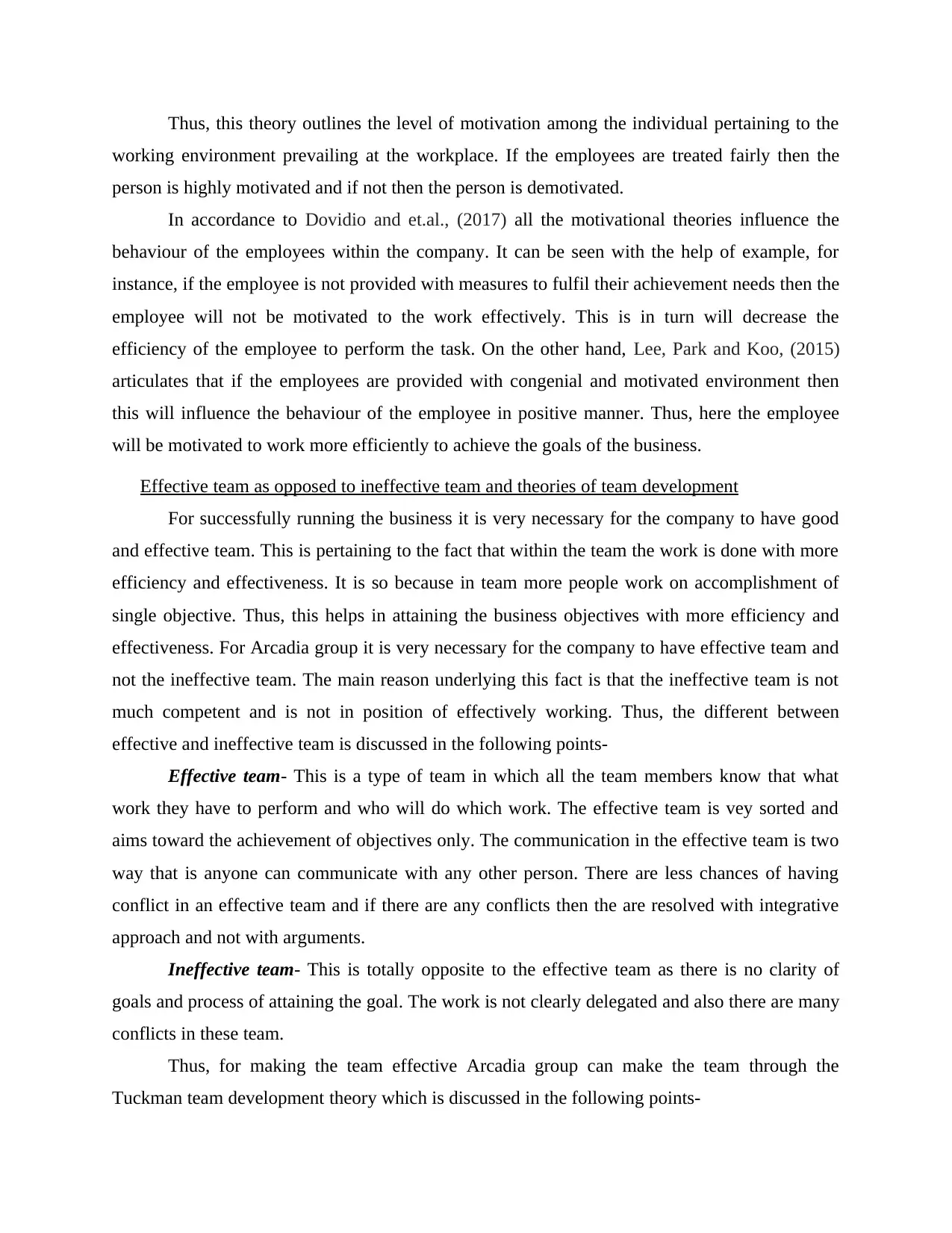
Thus, this theory outlines the level of motivation among the individual pertaining to the
working environment prevailing at the workplace. If the employees are treated fairly then the
person is highly motivated and if not then the person is demotivated.
In accordance to Dovidio and et.al., (2017) all the motivational theories influence the
behaviour of the employees within the company. It can be seen with the help of example, for
instance, if the employee is not provided with measures to fulfil their achievement needs then the
employee will not be motivated to the work effectively. This is in turn will decrease the
efficiency of the employee to perform the task. On the other hand, Lee, Park and Koo, (2015)
articulates that if the employees are provided with congenial and motivated environment then
this will influence the behaviour of the employee in positive manner. Thus, here the employee
will be motivated to work more efficiently to achieve the goals of the business.
Effective team as opposed to ineffective team and theories of team development
For successfully running the business it is very necessary for the company to have good
and effective team. This is pertaining to the fact that within the team the work is done with more
efficiency and effectiveness. It is so because in team more people work on accomplishment of
single objective. Thus, this helps in attaining the business objectives with more efficiency and
effectiveness. For Arcadia group it is very necessary for the company to have effective team and
not the ineffective team. The main reason underlying this fact is that the ineffective team is not
much competent and is not in position of effectively working. Thus, the different between
effective and ineffective team is discussed in the following points-
Effective team- This is a type of team in which all the team members know that what
work they have to perform and who will do which work. The effective team is vey sorted and
aims toward the achievement of objectives only. The communication in the effective team is two
way that is anyone can communicate with any other person. There are less chances of having
conflict in an effective team and if there are any conflicts then the are resolved with integrative
approach and not with arguments.
Ineffective team- This is totally opposite to the effective team as there is no clarity of
goals and process of attaining the goal. The work is not clearly delegated and also there are many
conflicts in these team.
Thus, for making the team effective Arcadia group can make the team through the
Tuckman team development theory which is discussed in the following points-
working environment prevailing at the workplace. If the employees are treated fairly then the
person is highly motivated and if not then the person is demotivated.
In accordance to Dovidio and et.al., (2017) all the motivational theories influence the
behaviour of the employees within the company. It can be seen with the help of example, for
instance, if the employee is not provided with measures to fulfil their achievement needs then the
employee will not be motivated to the work effectively. This is in turn will decrease the
efficiency of the employee to perform the task. On the other hand, Lee, Park and Koo, (2015)
articulates that if the employees are provided with congenial and motivated environment then
this will influence the behaviour of the employee in positive manner. Thus, here the employee
will be motivated to work more efficiently to achieve the goals of the business.
Effective team as opposed to ineffective team and theories of team development
For successfully running the business it is very necessary for the company to have good
and effective team. This is pertaining to the fact that within the team the work is done with more
efficiency and effectiveness. It is so because in team more people work on accomplishment of
single objective. Thus, this helps in attaining the business objectives with more efficiency and
effectiveness. For Arcadia group it is very necessary for the company to have effective team and
not the ineffective team. The main reason underlying this fact is that the ineffective team is not
much competent and is not in position of effectively working. Thus, the different between
effective and ineffective team is discussed in the following points-
Effective team- This is a type of team in which all the team members know that what
work they have to perform and who will do which work. The effective team is vey sorted and
aims toward the achievement of objectives only. The communication in the effective team is two
way that is anyone can communicate with any other person. There are less chances of having
conflict in an effective team and if there are any conflicts then the are resolved with integrative
approach and not with arguments.
Ineffective team- This is totally opposite to the effective team as there is no clarity of
goals and process of attaining the goal. The work is not clearly delegated and also there are many
conflicts in these team.
Thus, for making the team effective Arcadia group can make the team through the
Tuckman team development theory which is discussed in the following points-
Paraphrase This Document
Need a fresh take? Get an instant paraphrase of this document with our AI Paraphraser
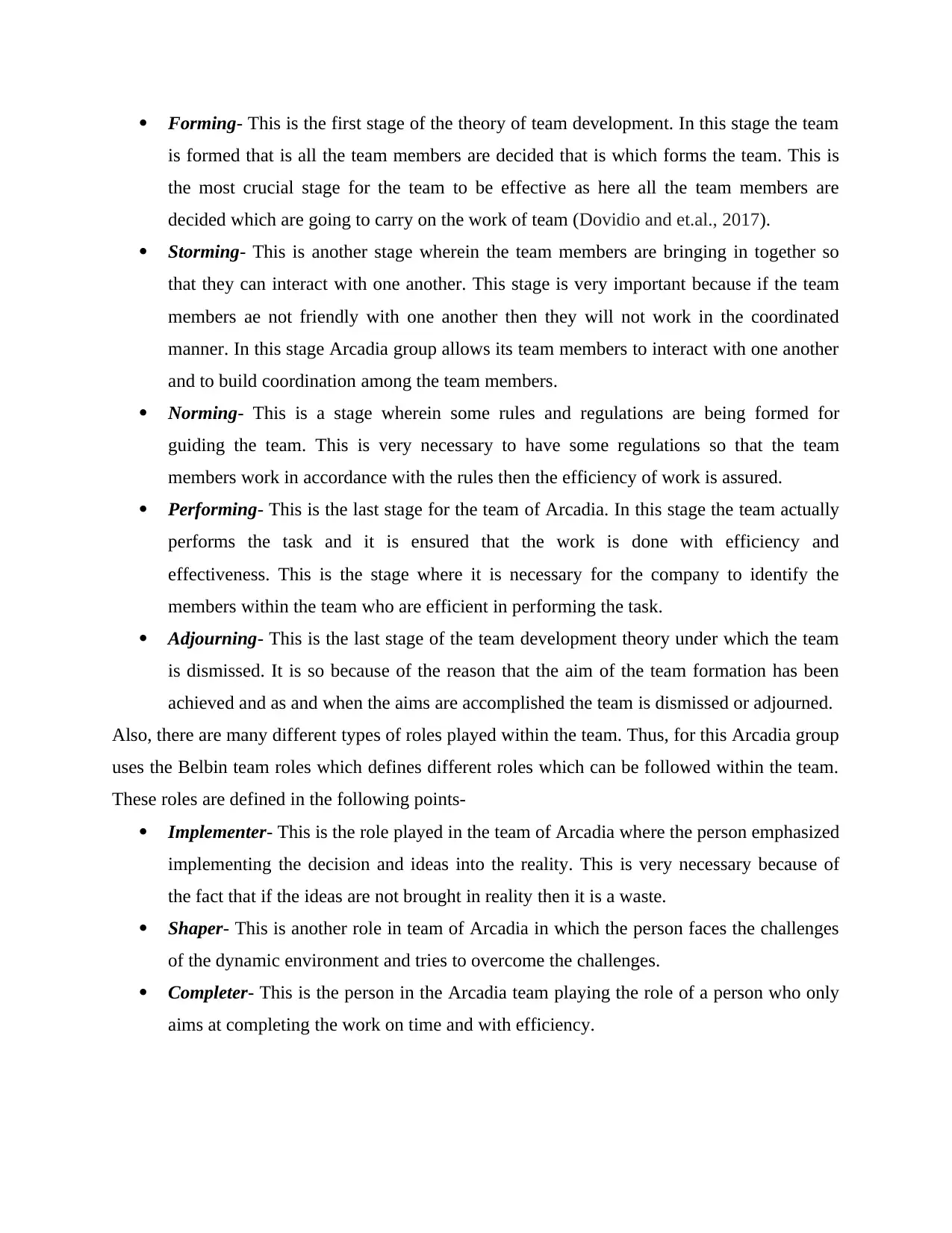
Forming- This is the first stage of the theory of team development. In this stage the team
is formed that is all the team members are decided that is which forms the team. This is
the most crucial stage for the team to be effective as here all the team members are
decided which are going to carry on the work of team (Dovidio and et.al., 2017).
Storming- This is another stage wherein the team members are bringing in together so
that they can interact with one another. This stage is very important because if the team
members ae not friendly with one another then they will not work in the coordinated
manner. In this stage Arcadia group allows its team members to interact with one another
and to build coordination among the team members.
Norming- This is a stage wherein some rules and regulations are being formed for
guiding the team. This is very necessary to have some regulations so that the team
members work in accordance with the rules then the efficiency of work is assured.
Performing- This is the last stage for the team of Arcadia. In this stage the team actually
performs the task and it is ensured that the work is done with efficiency and
effectiveness. This is the stage where it is necessary for the company to identify the
members within the team who are efficient in performing the task.
Adjourning- This is the last stage of the team development theory under which the team
is dismissed. It is so because of the reason that the aim of the team formation has been
achieved and as and when the aims are accomplished the team is dismissed or adjourned.
Also, there are many different types of roles played within the team. Thus, for this Arcadia group
uses the Belbin team roles which defines different roles which can be followed within the team.
These roles are defined in the following points-
Implementer- This is the role played in the team of Arcadia where the person emphasized
implementing the decision and ideas into the reality. This is very necessary because of
the fact that if the ideas are not brought in reality then it is a waste.
Shaper- This is another role in team of Arcadia in which the person faces the challenges
of the dynamic environment and tries to overcome the challenges.
Completer- This is the person in the Arcadia team playing the role of a person who only
aims at completing the work on time and with efficiency.
is formed that is all the team members are decided that is which forms the team. This is
the most crucial stage for the team to be effective as here all the team members are
decided which are going to carry on the work of team (Dovidio and et.al., 2017).
Storming- This is another stage wherein the team members are bringing in together so
that they can interact with one another. This stage is very important because if the team
members ae not friendly with one another then they will not work in the coordinated
manner. In this stage Arcadia group allows its team members to interact with one another
and to build coordination among the team members.
Norming- This is a stage wherein some rules and regulations are being formed for
guiding the team. This is very necessary to have some regulations so that the team
members work in accordance with the rules then the efficiency of work is assured.
Performing- This is the last stage for the team of Arcadia. In this stage the team actually
performs the task and it is ensured that the work is done with efficiency and
effectiveness. This is the stage where it is necessary for the company to identify the
members within the team who are efficient in performing the task.
Adjourning- This is the last stage of the team development theory under which the team
is dismissed. It is so because of the reason that the aim of the team formation has been
achieved and as and when the aims are accomplished the team is dismissed or adjourned.
Also, there are many different types of roles played within the team. Thus, for this Arcadia group
uses the Belbin team roles which defines different roles which can be followed within the team.
These roles are defined in the following points-
Implementer- This is the role played in the team of Arcadia where the person emphasized
implementing the decision and ideas into the reality. This is very necessary because of
the fact that if the ideas are not brought in reality then it is a waste.
Shaper- This is another role in team of Arcadia in which the person faces the challenges
of the dynamic environment and tries to overcome the challenges.
Completer- This is the person in the Arcadia team playing the role of a person who only
aims at completing the work on time and with efficiency.
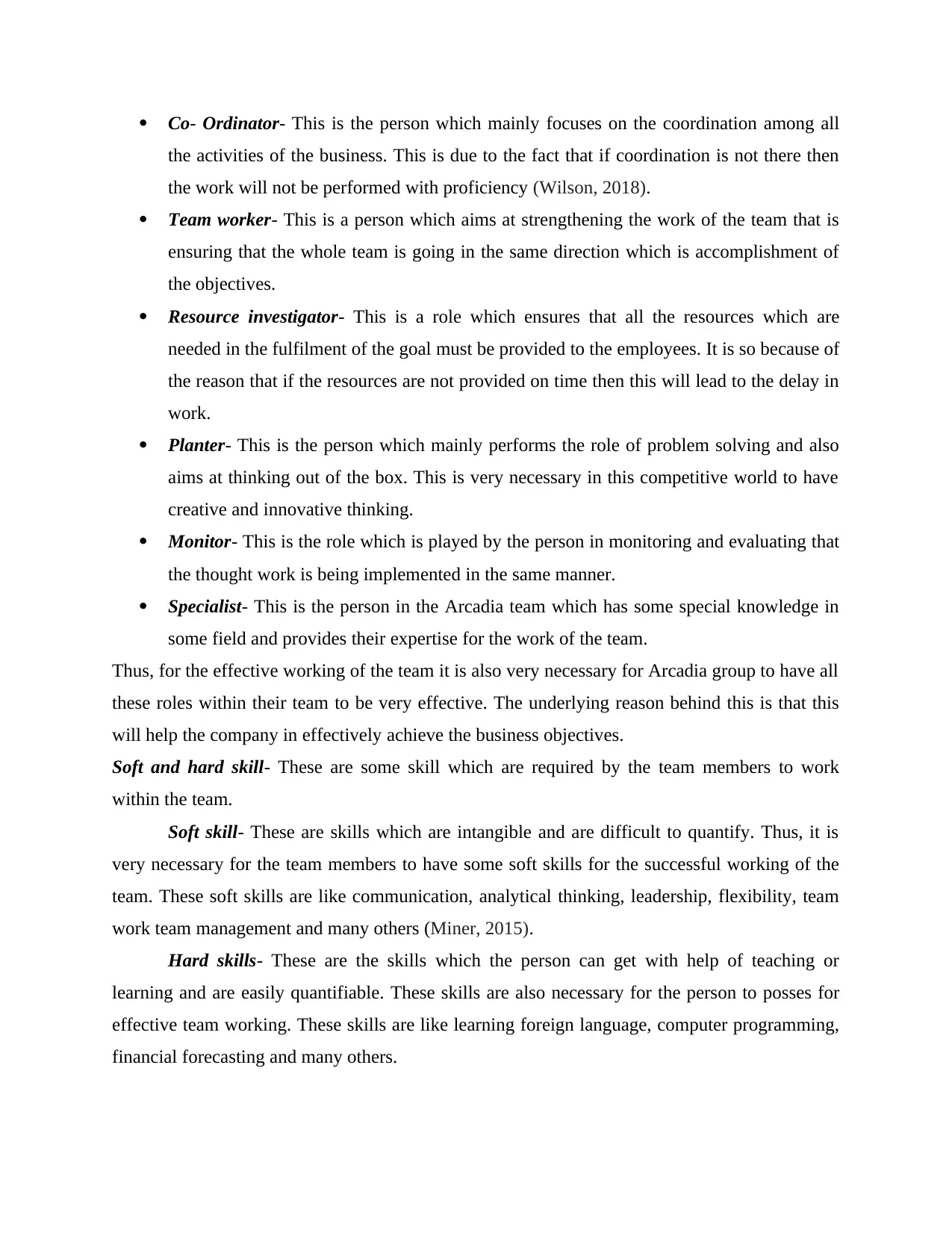
Co- Ordinator- This is the person which mainly focuses on the coordination among all
the activities of the business. This is due to the fact that if coordination is not there then
the work will not be performed with proficiency (Wilson, 2018).
Team worker- This is a person which aims at strengthening the work of the team that is
ensuring that the whole team is going in the same direction which is accomplishment of
the objectives.
Resource investigator- This is a role which ensures that all the resources which are
needed in the fulfilment of the goal must be provided to the employees. It is so because of
the reason that if the resources are not provided on time then this will lead to the delay in
work.
Planter- This is the person which mainly performs the role of problem solving and also
aims at thinking out of the box. This is very necessary in this competitive world to have
creative and innovative thinking.
Monitor- This is the role which is played by the person in monitoring and evaluating that
the thought work is being implemented in the same manner.
Specialist- This is the person in the Arcadia team which has some special knowledge in
some field and provides their expertise for the work of the team.
Thus, for the effective working of the team it is also very necessary for Arcadia group to have all
these roles within their team to be very effective. The underlying reason behind this is that this
will help the company in effectively achieve the business objectives.
Soft and hard skill- These are some skill which are required by the team members to work
within the team.
Soft skill- These are skills which are intangible and are difficult to quantify. Thus, it is
very necessary for the team members to have some soft skills for the successful working of the
team. These soft skills are like communication, analytical thinking, leadership, flexibility, team
work team management and many others (Miner, 2015).
Hard skills- These are the skills which the person can get with help of teaching or
learning and are easily quantifiable. These skills are also necessary for the person to posses for
effective team working. These skills are like learning foreign language, computer programming,
financial forecasting and many others.
the activities of the business. This is due to the fact that if coordination is not there then
the work will not be performed with proficiency (Wilson, 2018).
Team worker- This is a person which aims at strengthening the work of the team that is
ensuring that the whole team is going in the same direction which is accomplishment of
the objectives.
Resource investigator- This is a role which ensures that all the resources which are
needed in the fulfilment of the goal must be provided to the employees. It is so because of
the reason that if the resources are not provided on time then this will lead to the delay in
work.
Planter- This is the person which mainly performs the role of problem solving and also
aims at thinking out of the box. This is very necessary in this competitive world to have
creative and innovative thinking.
Monitor- This is the role which is played by the person in monitoring and evaluating that
the thought work is being implemented in the same manner.
Specialist- This is the person in the Arcadia team which has some special knowledge in
some field and provides their expertise for the work of the team.
Thus, for the effective working of the team it is also very necessary for Arcadia group to have all
these roles within their team to be very effective. The underlying reason behind this is that this
will help the company in effectively achieve the business objectives.
Soft and hard skill- These are some skill which are required by the team members to work
within the team.
Soft skill- These are skills which are intangible and are difficult to quantify. Thus, it is
very necessary for the team members to have some soft skills for the successful working of the
team. These soft skills are like communication, analytical thinking, leadership, flexibility, team
work team management and many others (Miner, 2015).
Hard skills- These are the skills which the person can get with help of teaching or
learning and are easily quantifiable. These skills are also necessary for the person to posses for
effective team working. These skills are like learning foreign language, computer programming,
financial forecasting and many others.
⊘ This is a preview!⊘
Do you want full access?
Subscribe today to unlock all pages.

Trusted by 1+ million students worldwide
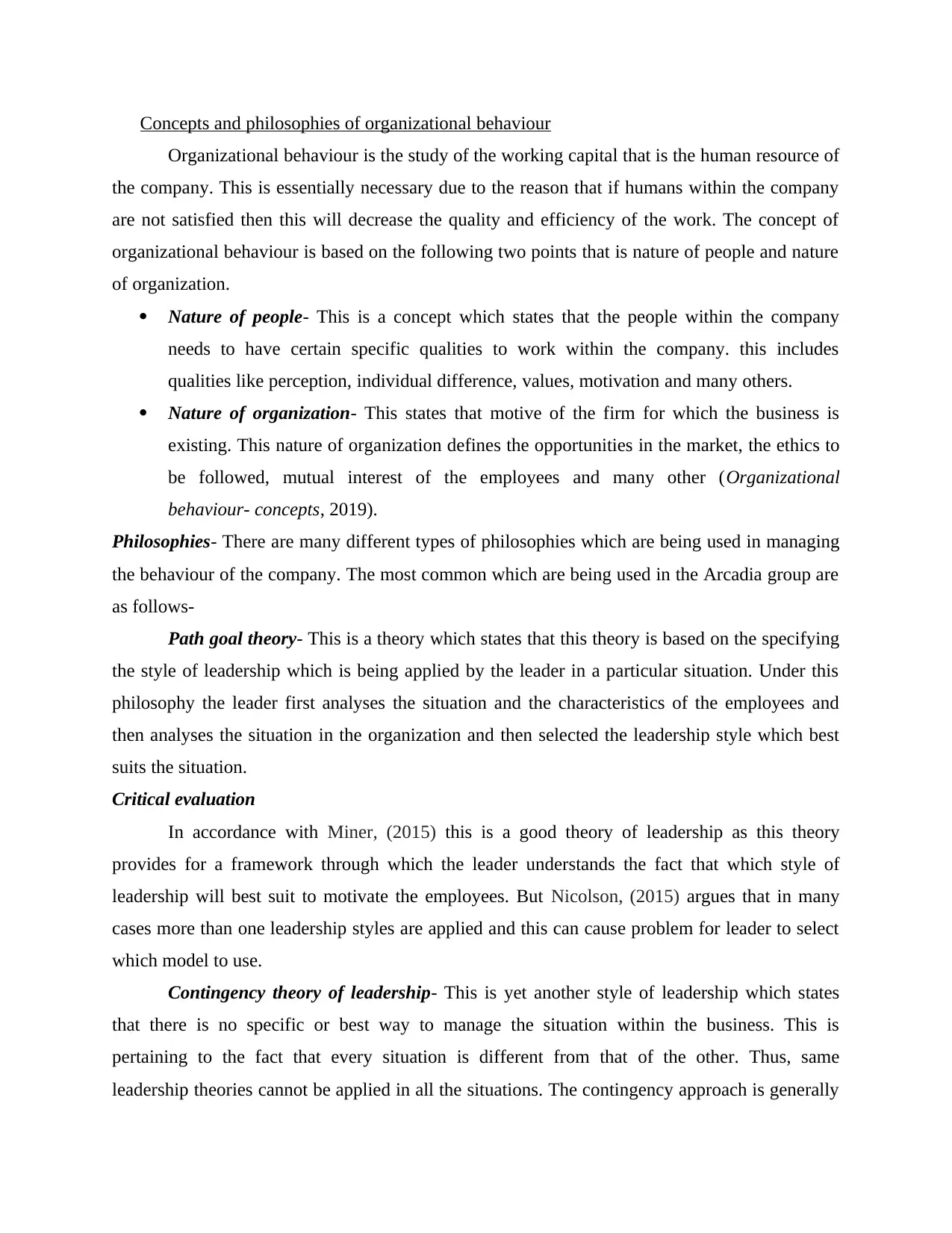
Concepts and philosophies of organizational behaviour
Organizational behaviour is the study of the working capital that is the human resource of
the company. This is essentially necessary due to the reason that if humans within the company
are not satisfied then this will decrease the quality and efficiency of the work. The concept of
organizational behaviour is based on the following two points that is nature of people and nature
of organization.
Nature of people- This is a concept which states that the people within the company
needs to have certain specific qualities to work within the company. this includes
qualities like perception, individual difference, values, motivation and many others.
Nature of organization- This states that motive of the firm for which the business is
existing. This nature of organization defines the opportunities in the market, the ethics to
be followed, mutual interest of the employees and many other (Organizational
behaviour- concepts, 2019).
Philosophies- There are many different types of philosophies which are being used in managing
the behaviour of the company. The most common which are being used in the Arcadia group are
as follows-
Path goal theory- This is a theory which states that this theory is based on the specifying
the style of leadership which is being applied by the leader in a particular situation. Under this
philosophy the leader first analyses the situation and the characteristics of the employees and
then analyses the situation in the organization and then selected the leadership style which best
suits the situation.
Critical evaluation
In accordance with Miner, (2015) this is a good theory of leadership as this theory
provides for a framework through which the leader understands the fact that which style of
leadership will best suit to motivate the employees. But Nicolson, (2015) argues that in many
cases more than one leadership styles are applied and this can cause problem for leader to select
which model to use.
Contingency theory of leadership- This is yet another style of leadership which states
that there is no specific or best way to manage the situation within the business. This is
pertaining to the fact that every situation is different from that of the other. Thus, same
leadership theories cannot be applied in all the situations. The contingency approach is generally
Organizational behaviour is the study of the working capital that is the human resource of
the company. This is essentially necessary due to the reason that if humans within the company
are not satisfied then this will decrease the quality and efficiency of the work. The concept of
organizational behaviour is based on the following two points that is nature of people and nature
of organization.
Nature of people- This is a concept which states that the people within the company
needs to have certain specific qualities to work within the company. this includes
qualities like perception, individual difference, values, motivation and many others.
Nature of organization- This states that motive of the firm for which the business is
existing. This nature of organization defines the opportunities in the market, the ethics to
be followed, mutual interest of the employees and many other (Organizational
behaviour- concepts, 2019).
Philosophies- There are many different types of philosophies which are being used in managing
the behaviour of the company. The most common which are being used in the Arcadia group are
as follows-
Path goal theory- This is a theory which states that this theory is based on the specifying
the style of leadership which is being applied by the leader in a particular situation. Under this
philosophy the leader first analyses the situation and the characteristics of the employees and
then analyses the situation in the organization and then selected the leadership style which best
suits the situation.
Critical evaluation
In accordance with Miner, (2015) this is a good theory of leadership as this theory
provides for a framework through which the leader understands the fact that which style of
leadership will best suit to motivate the employees. But Nicolson, (2015) argues that in many
cases more than one leadership styles are applied and this can cause problem for leader to select
which model to use.
Contingency theory of leadership- This is yet another style of leadership which states
that there is no specific or best way to manage the situation within the business. This is
pertaining to the fact that every situation is different from that of the other. Thus, same
leadership theories cannot be applied in all the situations. The contingency approach is generally
Paraphrase This Document
Need a fresh take? Get an instant paraphrase of this document with our AI Paraphraser
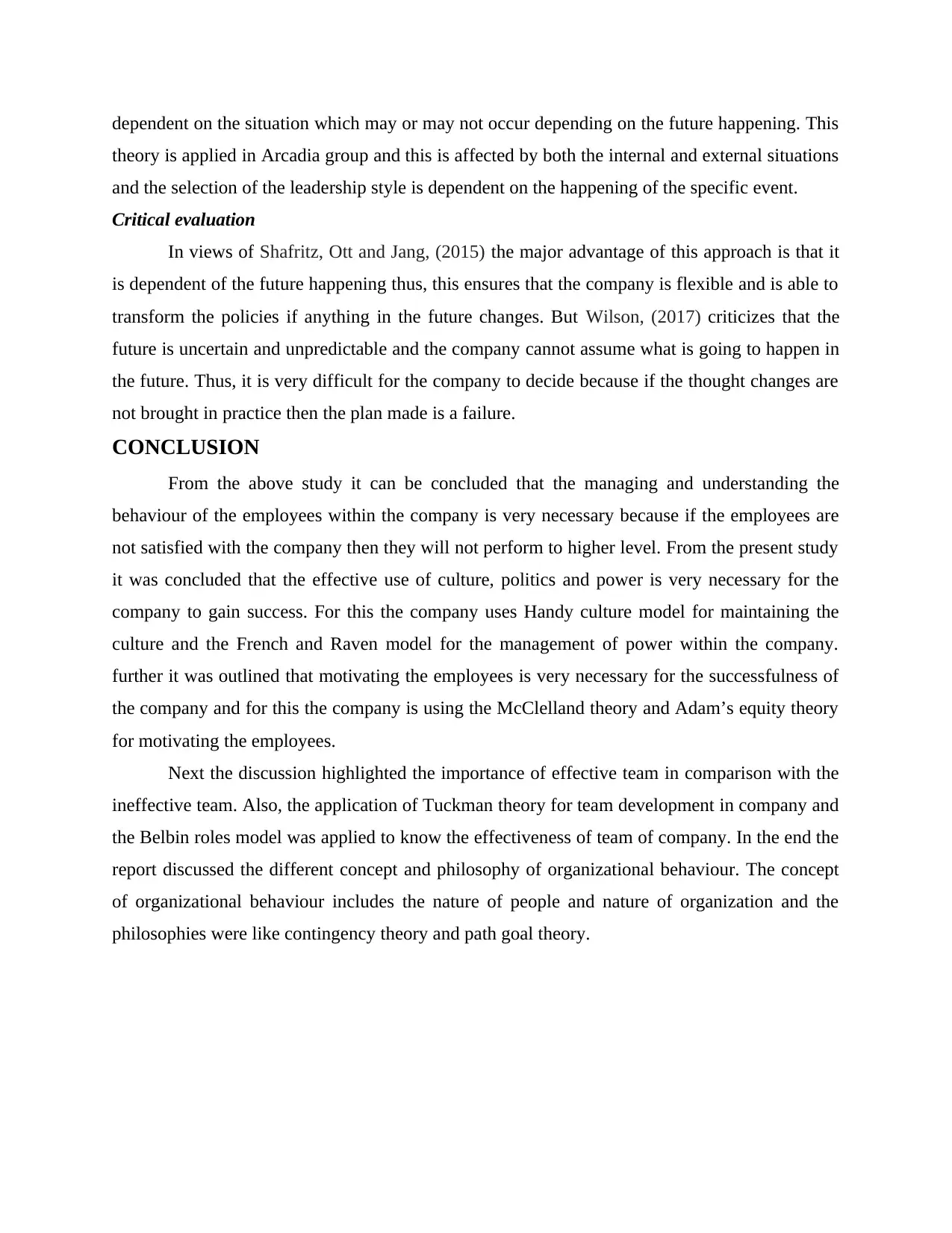
dependent on the situation which may or may not occur depending on the future happening. This
theory is applied in Arcadia group and this is affected by both the internal and external situations
and the selection of the leadership style is dependent on the happening of the specific event.
Critical evaluation
In views of Shafritz, Ott and Jang, (2015) the major advantage of this approach is that it
is dependent of the future happening thus, this ensures that the company is flexible and is able to
transform the policies if anything in the future changes. But Wilson, (2017) criticizes that the
future is uncertain and unpredictable and the company cannot assume what is going to happen in
the future. Thus, it is very difficult for the company to decide because if the thought changes are
not brought in practice then the plan made is a failure.
CONCLUSION
From the above study it can be concluded that the managing and understanding the
behaviour of the employees within the company is very necessary because if the employees are
not satisfied with the company then they will not perform to higher level. From the present study
it was concluded that the effective use of culture, politics and power is very necessary for the
company to gain success. For this the company uses Handy culture model for maintaining the
culture and the French and Raven model for the management of power within the company.
further it was outlined that motivating the employees is very necessary for the successfulness of
the company and for this the company is using the McClelland theory and Adam’s equity theory
for motivating the employees.
Next the discussion highlighted the importance of effective team in comparison with the
ineffective team. Also, the application of Tuckman theory for team development in company and
the Belbin roles model was applied to know the effectiveness of team of company. In the end the
report discussed the different concept and philosophy of organizational behaviour. The concept
of organizational behaviour includes the nature of people and nature of organization and the
philosophies were like contingency theory and path goal theory.
theory is applied in Arcadia group and this is affected by both the internal and external situations
and the selection of the leadership style is dependent on the happening of the specific event.
Critical evaluation
In views of Shafritz, Ott and Jang, (2015) the major advantage of this approach is that it
is dependent of the future happening thus, this ensures that the company is flexible and is able to
transform the policies if anything in the future changes. But Wilson, (2017) criticizes that the
future is uncertain and unpredictable and the company cannot assume what is going to happen in
the future. Thus, it is very difficult for the company to decide because if the thought changes are
not brought in practice then the plan made is a failure.
CONCLUSION
From the above study it can be concluded that the managing and understanding the
behaviour of the employees within the company is very necessary because if the employees are
not satisfied with the company then they will not perform to higher level. From the present study
it was concluded that the effective use of culture, politics and power is very necessary for the
company to gain success. For this the company uses Handy culture model for maintaining the
culture and the French and Raven model for the management of power within the company.
further it was outlined that motivating the employees is very necessary for the successfulness of
the company and for this the company is using the McClelland theory and Adam’s equity theory
for motivating the employees.
Next the discussion highlighted the importance of effective team in comparison with the
ineffective team. Also, the application of Tuckman theory for team development in company and
the Belbin roles model was applied to know the effectiveness of team of company. In the end the
report discussed the different concept and philosophy of organizational behaviour. The concept
of organizational behaviour includes the nature of people and nature of organization and the
philosophies were like contingency theory and path goal theory.
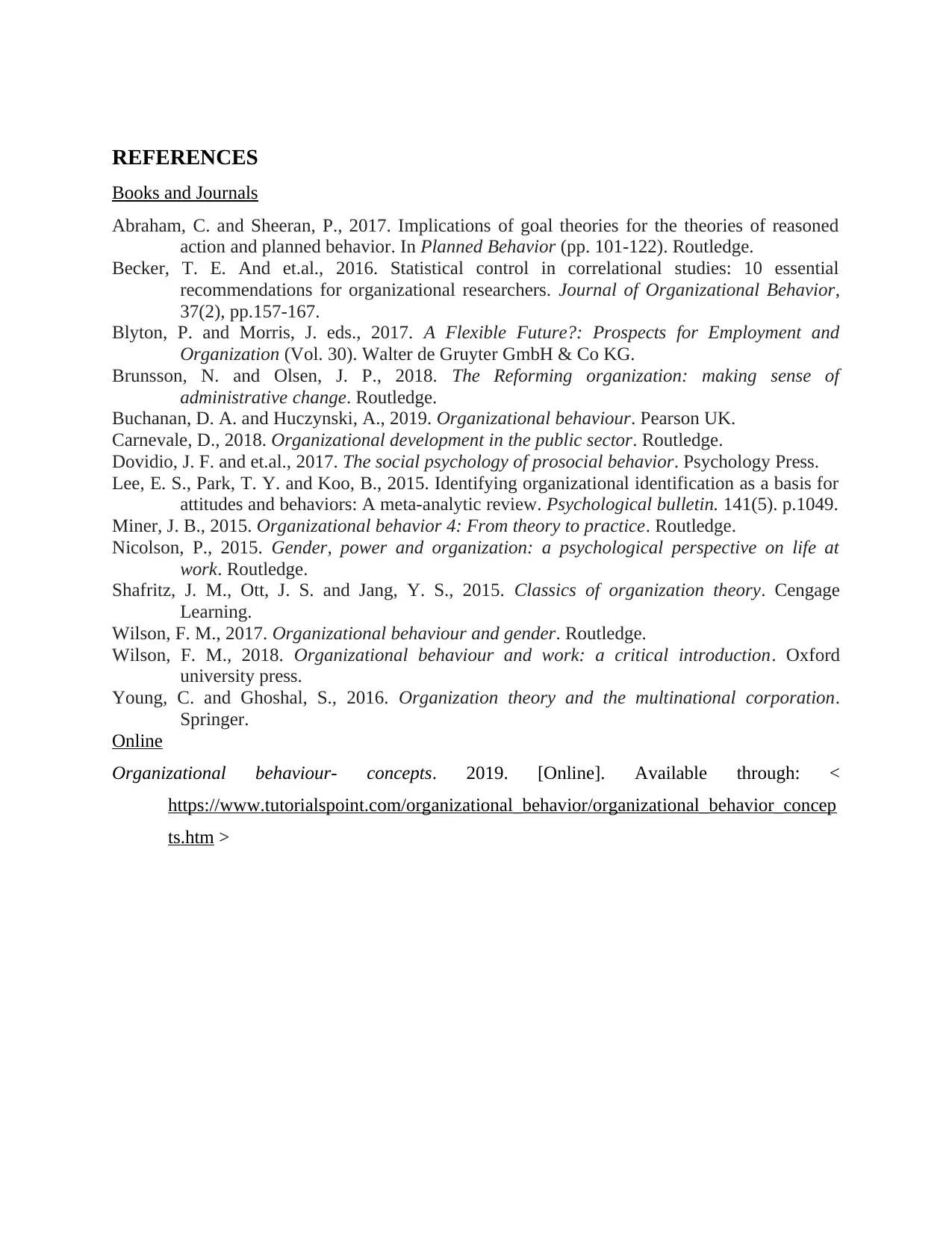
REFERENCES
Books and Journals
Abraham, C. and Sheeran, P., 2017. Implications of goal theories for the theories of reasoned
action and planned behavior. In Planned Behavior (pp. 101-122). Routledge.
Becker, T. E. And et.al., 2016. Statistical control in correlational studies: 10 essential
recommendations for organizational researchers. Journal of Organizational Behavior,
37(2), pp.157-167.
Blyton, P. and Morris, J. eds., 2017. A Flexible Future?: Prospects for Employment and
Organization (Vol. 30). Walter de Gruyter GmbH & Co KG.
Brunsson, N. and Olsen, J. P., 2018. The Reforming organization: making sense of
administrative change. Routledge.
Buchanan, D. A. and Huczynski, A., 2019. Organizational behaviour. Pearson UK.
Carnevale, D., 2018. Organizational development in the public sector. Routledge.
Dovidio, J. F. and et.al., 2017. The social psychology of prosocial behavior. Psychology Press.
Lee, E. S., Park, T. Y. and Koo, B., 2015. Identifying organizational identification as a basis for
attitudes and behaviors: A meta-analytic review. Psychological bulletin. 141(5). p.1049.
Miner, J. B., 2015. Organizational behavior 4: From theory to practice. Routledge.
Nicolson, P., 2015. Gender, power and organization: a psychological perspective on life at
work. Routledge.
Shafritz, J. M., Ott, J. S. and Jang, Y. S., 2015. Classics of organization theory. Cengage
Learning.
Wilson, F. M., 2017. Organizational behaviour and gender. Routledge.
Wilson, F. M., 2018. Organizational behaviour and work: a critical introduction. Oxford
university press.
Young, C. and Ghoshal, S., 2016. Organization theory and the multinational corporation.
Springer.
Online
Organizational behaviour- concepts. 2019. [Online]. Available through: <
https://www.tutorialspoint.com/organizational_behavior/organizational_behavior_concep
ts.htm >
Books and Journals
Abraham, C. and Sheeran, P., 2017. Implications of goal theories for the theories of reasoned
action and planned behavior. In Planned Behavior (pp. 101-122). Routledge.
Becker, T. E. And et.al., 2016. Statistical control in correlational studies: 10 essential
recommendations for organizational researchers. Journal of Organizational Behavior,
37(2), pp.157-167.
Blyton, P. and Morris, J. eds., 2017. A Flexible Future?: Prospects for Employment and
Organization (Vol. 30). Walter de Gruyter GmbH & Co KG.
Brunsson, N. and Olsen, J. P., 2018. The Reforming organization: making sense of
administrative change. Routledge.
Buchanan, D. A. and Huczynski, A., 2019. Organizational behaviour. Pearson UK.
Carnevale, D., 2018. Organizational development in the public sector. Routledge.
Dovidio, J. F. and et.al., 2017. The social psychology of prosocial behavior. Psychology Press.
Lee, E. S., Park, T. Y. and Koo, B., 2015. Identifying organizational identification as a basis for
attitudes and behaviors: A meta-analytic review. Psychological bulletin. 141(5). p.1049.
Miner, J. B., 2015. Organizational behavior 4: From theory to practice. Routledge.
Nicolson, P., 2015. Gender, power and organization: a psychological perspective on life at
work. Routledge.
Shafritz, J. M., Ott, J. S. and Jang, Y. S., 2015. Classics of organization theory. Cengage
Learning.
Wilson, F. M., 2017. Organizational behaviour and gender. Routledge.
Wilson, F. M., 2018. Organizational behaviour and work: a critical introduction. Oxford
university press.
Young, C. and Ghoshal, S., 2016. Organization theory and the multinational corporation.
Springer.
Online
Organizational behaviour- concepts. 2019. [Online]. Available through: <
https://www.tutorialspoint.com/organizational_behavior/organizational_behavior_concep
ts.htm >
⊘ This is a preview!⊘
Do you want full access?
Subscribe today to unlock all pages.

Trusted by 1+ million students worldwide
1 out of 12
Related Documents
Your All-in-One AI-Powered Toolkit for Academic Success.
+13062052269
info@desklib.com
Available 24*7 on WhatsApp / Email
![[object Object]](/_next/static/media/star-bottom.7253800d.svg)
Unlock your academic potential
Copyright © 2020–2026 A2Z Services. All Rights Reserved. Developed and managed by ZUCOL.





